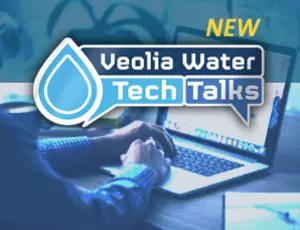PFAS are water-soluble and can be prevalent in ground waters, surface water, and wastewater treatment plant discharges.
Per- and Polyfluorinated-Alkyl Substances (PFAS) are a class of anthropogenic chemicals containing fluorinated carbons with a charged functional group (carboxylic acid or sulfonic acid) that is resistant to degradation.
PFAS Solutions by Veolia
If your current treatment plant only requires a polishing step to reduce PFAS concentrations, Veolia offers cost-effective standard solutions such as activated carbon pressure filters and ion exchange systems to accomplish this. If your water source has other areas of concern in addition to PFAS such as hardness, nitrates, perchlorate, organics, or turbidity, Veolia can provide a complete system for your total treatment needs.
With a collection of small flow (1 gpm or less) carbon and ion exchange column testing skids, Veolia can quickly provide a testing skid along with carbon and resin media to help determine the most cost-effective treatment approach.
If needed, Veolia can also deploy mobile treatment units to maintain water production while source water management and treatment technology evaluations are conducted.
PFAS Testing to Confirm Treatment Process Performance
Veolia offers a range of customized solutions based on individual water source demands. Bench scale and/or pilot testing can be done in order to determine a treatment configuration best suited for the type and concentration of PFAS, the presence of other contaminants and organics in the source water, and the desired quality of the treated water.
Tailored Solutions
Mobile Services: Veolia maintains a fleet of mobile water treatment units that can be deployed on-site for long-term or short-term in-situ treatment.
Standardized Solutions
Ion Exchange & Activated Carbon: Veolia also provides standardized package systems that can be delivered to site as one unit.
Customized Treatment
If your raw water quality requires pretreatment to maximize the effectiveness of the PFAS treatment technology, Veolia can provide a variety of pretreatment options allowing for the most cost-effective total treatment solution to be determined.
FAQ's
How can PFAS be treated in water?
How can PFAS be treated in water?
Veolia Groundwater Remediation removes pollutants and/or converts them into harmless byproducts.
Our softening pretreatment technologies are designed to ensure high performance while providing lowest life cycle costs. While our drinking water pretreatment technologies remove organics, nitrate, and turbidity to guarantee a clean water supply.
Featured Resources & Information
The information contained in this statement is based on the Veolia group's understanding and know-how of the scientific and technical fields discussed herein as of the time of publication. Statements that may be interpreted as predictive of future outcomes or performance should not be considered guarantees of such, but rather reasoned assessments of the possible evolution of the technologies described.
As this document is based on the state of the Veolia group's scientific, technical, and regulatory knowledge at the time of its publication, the completeness and accuracy of the information contained herein cannot be guaranteed.
Descriptions contained herein apply exclusively to those examples and/or to the general situations specifically referenced, and in no event should be considered to apply to specific scenarios without prior review and validation.








